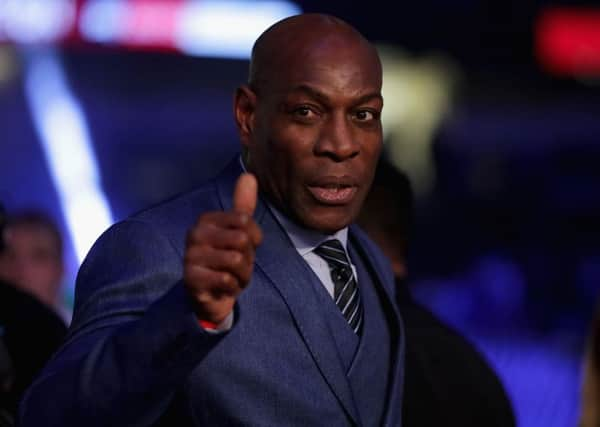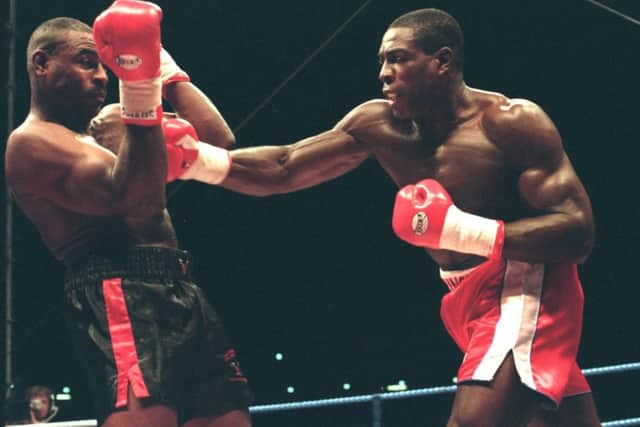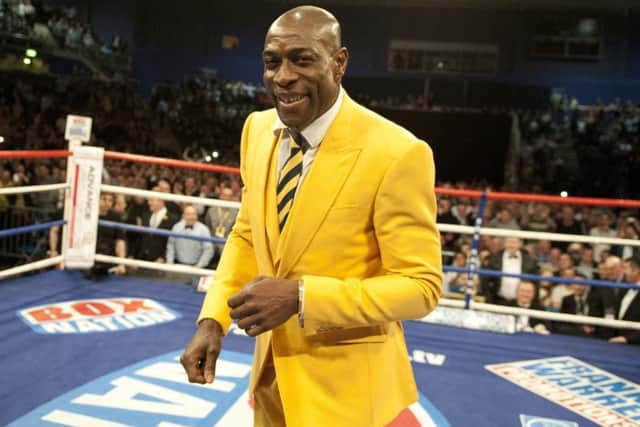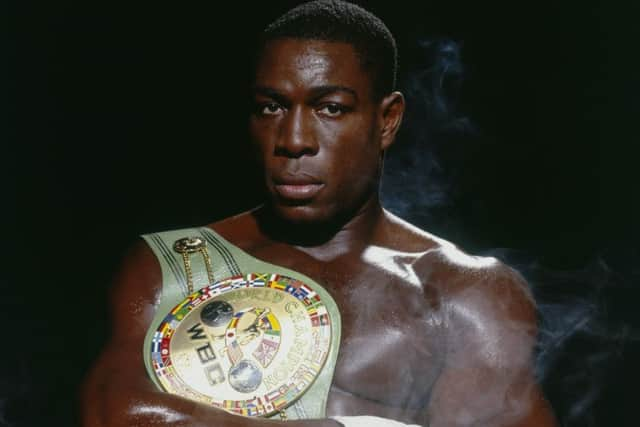How Frank Bruno got back off the canvas after his hardest fight


It is a simple statement but one that nevertheless will mean much to his countless fans. “I’m much more happy,” explains Frank Bruno. “As you get older, you get a little bit wiser and accept a bit more help.”
Despite the skill and determination that once made him heavyweight champion of the world - and the attendant wealth, fame and public adoration that came with his boxing talent - life has rarely been easy for one of Britain’s most-loved sporting heroes.
Advertisement
Hide AdAdvertisement
Hide AdSo it will be a relief for many to hear that Bruno, who suffers with bipolar disorder and was sectioned in 2003 and twice in 2012, feels life is good again.


The 56-year-old father-of-four will soon become a grandad, with two of his daughters both expecting baby girls in the next few months. Bruno says he has cut the “wrong people” who were negative influences out of his life and is effectively managing his bipolar condition - while accepting dealing with the illness will always be an ongoing fight.
“It is about how you structure yourself and look after yourself,” he says. “If you are going to train for a marathon, you have to balance and pace yourself.”
Speaking to The Yorkshire Post over the phone ahead of an appearance at the Bradford Literature Festival next week, the conversation is only seconds old before his trademark booming laugh can be heard in response to a question about whether he is now used to public speaking engagements.
Advertisement
Hide AdAdvertisement
Hide AdFor Frank, the answer seems laughingly obvious. “I have been retired 23 years, so I have been up and down the country doing these kind of things.”


His cheery demeanour is in contrast to where Bruno was just a few years ago. In 2013, a BBC documentary made by his daughter Rachel showed him living alone following a recent spell in hospital and highlighted the impact on his family of his mental illness.
Rachel explained in the programme that prior to the first time he was sectioned under the Mental Health Act back in 2003, Bruno’s increasingly-erratic behaviour had included him hearing voices, sleeping in a boxing ring that he had installed in his garden and walking down his local high street with no shoes on.
The documentary showed Bruno starting to come to terms with his condition but insisting he was happy looking after himself.
Advertisement
Hide AdAdvertisement
Hide AdHe says today that situation has changed. “I have got myself a little bit of help. Before I wouldn’t get no help, I was there by myself trying to cook, cut the lawn, wash and clean the house - I wanted to do everything. But no man is an island.”


The topic of Frank’s fight with mental illness is sure to be on the agenda when he comes to Yorkshire next week for a special ‘In Conversation’ event hosted by BBC Look North’s Harry Gration.
The event at the University of Bradford, which is part of the Bradford Literature Festival, follows last year’s publication of Let Me Be Frank, an autobiography picking up the story of his life since his award-winning 2006 book Frank: Fighting Back.
But it will also focus on the reason for his fame; his extraordinary boxing career which saw him 40 of his 45 fights, 38 of them by knockout.
Advertisement
Hide AdAdvertisement
Hide AdBruno first started boxing when he was around eight years old but after a spell in borstal when he was 12, he initially went into the world of work when he was 16. But Bruno says his dyslexia limited the work he could get to labouring jobs and he instead decided to pursue boxing as a career.
“I enjoyed being in the ring. It is a high-pressure job, the pressure is on you all the time. It was a gamble because anything can happen in boxing. You can get a detached retina and bust your ribs. I had 45 professional fights and every single one was a memory for me.”
He says he approached each fight with a mixture of focus, nerves and adrenaline when the time came for the opening bell.
“It is very nerve-wracking going into a boxing ring - you don’t know whether you are going to come out to fight as you’ve spent months training, or just freeze,” he says. “Mentally, it is very, very hard going into the ring.”
Advertisement
Hide AdAdvertisement
Hide AdWhile he may have felt mixed feelings about his sport, there was little doubting his ability. Soon after Bruno turned professional in 1982, he amassed 21 consecutive knock-out victories - a run only ended in 1984 by future world heavyweight champion James ‘Bonecrusher’ Smith.
But Frank quickly became the people’s champion, thanks in part to his rapport with BBC boxing commentator Harry Carpenter and his still-famous catchphrase ‘Know what I mean, Harry?’ in their frequent interviews.
“I wasn’t a really talented boxer but I was very, very hungry,” Bruno modestly says today.
Bruno won the European heavyweight title in 1985 but lost his world title challenge the following year to Tim Witherspoon.
Advertisement
Hide AdAdvertisement
Hide AdIn 1989, he took on Mike Tyson for the first time for the undisputed world heavyweight title but was knocked out in the fifth round and in 1993, missed out once again on his third world title chance in a defeat to fellow Brit Lennox Lewis.
But the determined Bruno finally achieved his dream of becoming world champion in 1995 as he beat Oliver McCall over 12 rounds to win the WBC belt in an emotional evening at Wembley Stadium.
However, his joy was short-lived. Just six months later, he was defeated by Mike Tyson once again - this time being left with a severe eye injury. With doctors warning any further damage could result in permanent blindness, Bruno was forced to retire from the sport at the age of 35.
He says it was a struggle to adjust to life outside the ring.
Advertisement
Hide AdAdvertisement
Hide Ad“When you have been doing something for almost 30 years and then suddenly retire, it is very, very hard.”
But despite his attempts to remain busy after boxing - including continuing with a daily training regime, appearing in pantomimes and even going to drama class - Bruno says at times it could be a “boring old life” compared to the highs and lows of professional sport.
Problems with drug use began in 2000 and divorce from his wife Laura followed a year later, before his breakdown in 2003 that led to him being sectioned. There was an outraged public reaction when The Sun ran the story with the headline ‘Bonkers Bruno Locked Up’ - with reports that people had torn the front pages of the paper off in protest.
For all his public trials, Bruno says his charity work - including as associate of The Shannon Bradshaw Trust which supports children with life-threatening conditions, The Essex Disabled Sports Foundation and now his own Frank Bruno Foundation - puts things in perspective.
Advertisement
Hide AdAdvertisement
Hide Ad“Sometimes you take things for granted,” he says. “You see people on television who haven’t got any shoes or water or a roof over their heads. And then other people are moaning that the weather is too hot. You think you have got something to moan about when you haven’t got nothing to moan about.”
Bruno says there is a far greater public understanding of mental health issues than there was 15 years ago.
“Mental health problems can affect anyone in the country - people struggling to pay their mortgage and having a breakdown from the stress. It is something you can never run away from. Everybody has got drama in their life
“Sometimes it is good to chat, it could happen to anybody.”
Despite receiving thousands of letters of thanks from people dealing with their own mental health illnesses thanking him for his bravery in sharing his story, Bruno typically downplays his own influence in aiding public understanding.
Advertisement
Hide AdAdvertisement
Hide Ad“I’m only human. I’m no more better than everybody else. I do have bad days and I have good days. But these are good times.”
Bruno says things have calmed down since the height of his fame in the 1990s but he remains a popular figure.
“I have always said, all I am is a boxer, I’m not better than anyone else. But I can walk proud down the street.”
He is considering a possible return to boxing and has earned a coaching licence but says there are no immediate plans on the cards.
Advertisement
Hide AdAdvertisement
Hide Ad“I’m taking things as it comes, it is duck and dive, duck and dive,” he says. “But I have got a good vibe at the minute.”
Frank’s new book Let Me Be Frank will be available at the Bradford Literature Festival. Signed copies of the hardback are available from www.frankbruno.co.uk. To book tickets to his talk in Bradford, visit www.bradfordlitfest.co.uk.